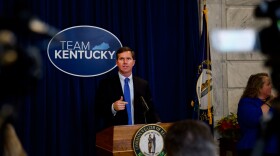More young people in Louisville are contracting COVID-19 and battling lingering health issues from the disease, health officials said Tuesday.
During Tuesday’s coronavirus press briefing, Mayor Greg Fischer said Louisville’s numbers are “heading in the wrong direction,” and reported a total of 19,795 cases and 338 deaths since the beginning of the pandemic. Spikes are occurring across the United States and in Kentucky, which has broken its record for weekly cases three weeks in a row.
Louisville’s Chief Health Strategist Dr. Sarah Moyer said despite the upticks, the city is not yet in the “red zone,” which is defined as having more than 25 cases per 100,000 people.
“We are right at that orange, borderline red this week,” she said. “The good news is we did not continue on that upward trend. Our case count stayed steady last week.”
But Dr. Sonia Compton, a pulmonary and critical care specialist, has concerns about emerging trends in who is contracting COVID-19 and how it’s affecting them.
Early in the pandemic, many cases involved older people with underlying health conditions like heart and lung disease. Now, Compton said doctors are seeing more young patients develop severe complications that lead to long stays in the ICU.
“Patients in their 30s, 40s and 50s are getting much sicker and having much more prolonged illnesses and much more severity in illness,” Compton said. “Something that we saw early on were people with a lot of comorbidities, people who had other health problems underlying. Now we’re seeing people with fewer underlying health issues – people who may just have high blood pressure or just be slightly overweight – and that’s a concern.”
Young people who contract COVID-19 are also dealing with prolonged health issues long after being diagnosed. Compton described one case involving a man with no underlying conditions other than asthma.
The man was diagnosed with COVID-19 nearly three months ago, and eventually spent time in the ICU. Compton said despite improvements in CT scans and oxygen levels, the man is still suffering from shortness of breath and chest pain that limit his daily activities.
“This is something that we in medicine are slowly starting to call the ‘post-COVID syndrome,’” Compton said. “No one knows quite yet how to define or how to treat this. There’s no treatment for this lingering after effect of COVID that we’re going to keep seeing. People are going to be limited by this.”
Another area of concern is the disproportionate effect of the virus on Black and Asian populations. Moyer said that white people make up about 70% of Louisville’s population, but just 60% of COVID-19 cases.
“We know we have years of trust and other inequities in our healthcare system that we are battling against, not just with coronavirus but with every disease,” Moyer said. “COVID is just highlighting the inequities and disparities that we have in our current system.”
Officials believe “COVID-19 fatigue” is also playing a role in recent upticks seen locally and across the country. Many people are also doubting the efficacy of masks due to increased spread, Compton said.
But COVID-19 cases are on the rise not because masks don’t work, but because people are more often participating in other risky behaviors that go against best practices to prevent spread, she said.
“People are going out and doing more in bigger groups, and they really shouldn’t be right now,” Compton said. “This is the time that we shouldn’t be giving up on our social distancing and masking. I think in most cases, we can identify some behavior, some time that patients were not wearing a mask or traveled to a hotspot or did something that probably led to their illness.”
Next to wearing masks and practicing social distancing, Moyer said the best way to prevent spread is testing. She added that rapid testing, though seemingly more convenient, may not be as accurate as conventional testing.
“I know a lot of people are driving around the state looking for the rapid tests,” Moyer said. “The tests that we are offered here in Louisville are much more accurate, and those results are getting back quickly.”
Moyer said there are more than 20 testing sites in Louisville, and that a majority are getting results back in 12 to 24 hours.






